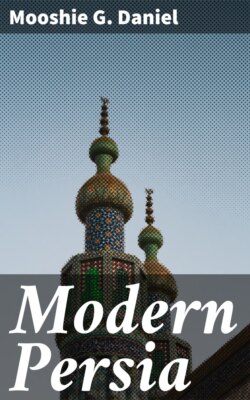Modern Persia

Реклама. ООО «ЛитРес», ИНН: 7719571260.
Оглавление
Mooshie G. Daniel. Modern Persia
Modern Persia
Table of Contents
LIFE OF MOOSHIE G. DANIEL IN PERSIA
LIFE OF MOOSHI G. DANIEL IN AMERICA
INTRODUCTION
CHAPTER I
CHAPTER II
CHAPTER III
CHAPTER IV
CHAPTER I
CHAPTER II
CHAPTER III
CHAPTER IV
CHAPTER V
CHAPTER VI
CHAPTER VII
CHAPTER VIII
CHAPTER IX
CHAPTER X
CHAPTER XI
CHAPTER XII
CHAPTER I
CHAPTER II
CHAPTER III
CHAPTER IV
CHAPTER I
CHAPTER II
CHAPTER I
CHAPTER II
CHAPTER III
CHAPTER IV
CHAPTER V
CHAPTER VI
CHAPTER VII
CHAPTER VIII
CHAPTER I
CHAPTER II
CHAPTER III
CHAPTER IV
CHAPTER V
CHAPTER VI
Отрывок из книги
Mooshie G. Daniel
Published by Good Press, 2019
.....
Shah Abbos I, the great, who was one of the most glorious of Persia's modern kings ascended the throne in 1585 and ruled until 1628. He restored internal tranquillity and repelled the invasions of the Uzbeks and Turks. In the year 1605 he gave the Turks such a terrific drubbing that they made no more trouble during his long reign. He also restored to his kingdom Kurdiston-Mosul and Diarbekir which had long been separated from Persia. Abbos' government was strict, but just and equitable. Roads, bridges, caravansaries, and other conveniences for trade were constructed at great cost, and the improvement and ornamentation of the towns were not neglected. Many of his large caravansaries which bear his name remain to this day. Isphahan, his capital, in a brief period of his reign, doubled its population. His tolerance was remarkable, considering the character of his ancestors and subjects, for he encouraged the Armenian Christians to settle in the country, well knowing that their peaceable industrious habits would enhance the prosperity of his kingdom. His successors were Shah Sufi (1628–41), Shah Abbos II, (1641–66), and Shah Soliman (1666–94). During the reign of Shah Sultan Hussein (1694–1722), a weak and foolish prince, priests and slaves were elevated to high offices and the Sunnites suffered sore persecution. The result was that Afghan besieged the king in Isphahan. Hussein abdicated the throne in favor of his conqueror, who ultimately became insane and suffered deposition in 1725 at the hands of his brother, Ashrab. The atrocious tyranny of Ashrab was suddenly checked by the celebrated Nadir-Shah. Hussein and Ashrab belonged to the dynasty of Syydes, a holy sect, descendants of their prophet, Mohammed. Nadir-Shah was one of the greatest warriors of Persia. He raised Tah-Masip (1729–82) and his son Abbos III (1732–36), of the Suffivian race, to the throne and then on some frivolous pretext, deposed Abbos III, and seized the scepter himself (1736–47). Nadir was assassinated by Imam-Kuli-Khan, of Oroomiah, whose descendants now live very near our Mission Station in Oroomiah. Again after the murder of Nadir, Persia was divided into many independent states and became a field of blood. Bloogistan and Afghaniston became independent till 1755 when a Kurd, Karim Khan (1755–79), abolished this state of affairs, reestablished peace and unity in western Persia, and by his justice, wisdom, and warlike talents acquired both the esteem of his subjects and the respect of the neighboring states. He received the title, "Father of Persia." Karim Khan was succeeded in 1784 by Al-Murad, then by Jaafor and the latter by Lutf-Ali-Merza.
KING KARIM KHAN KURD.
.....